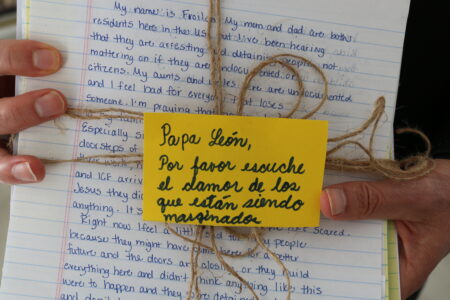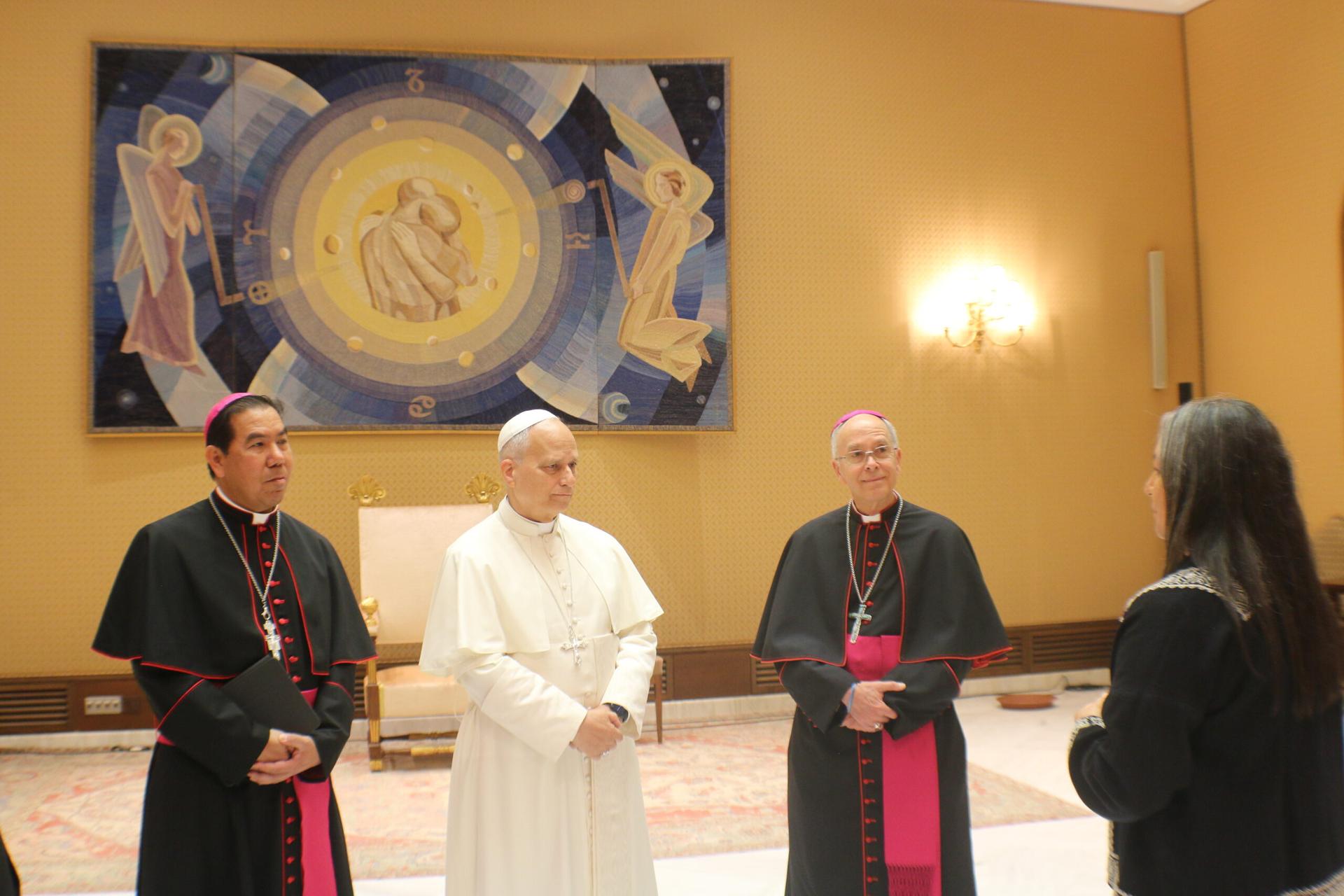ROME – Pope Leo XIV received messages from the immigrant community in the United States on Wednesday during a private audience at the Vatican, telling Bishop Mark Seitz of El Paso, TX, and representatives of the El Paso-based Hope Border Institute, “You stand with me, and I stand with you.”
The audience came as tensions over US immigration policy and enforcement continued to rise, with reports of out-of-state National Guard troops readying to deploy as soon as Wednesday night to an Immigration and Customs Enforcement (ICE) processing center near Chicago, IL, where the man who would become Pope Leo XIV was born.
“I prefer not to comment at this time about choices made, political choices within the United States,” Pope Leo told reporters on Tuesday, the day before the private audience, who had asked him about the plans of US President Donald Trump to use the military in the pope’s own native city.
The private audience also came just over a week after Pope Leo XIV made remarks to journalists regarding a controversy in the United States, reflecting on what it means to be pro-life.
The Hope Border Institute is an organization rooted in Catholic social teaching that conducts research, leadership development, advocacy, and humanitarian action strategy for faith leaders active at the US-Mexico border.
During the meeting, the pontiff expressed his support for all immigrants in their legitimate aspirations and voiced his opposition to policies which deny the human dignity of those who migrate.
Seitz, who is chairman of the United States Conference of Catholic Bishops Committee on Migration, spoke with Crux Now about the audience.
The following Q&A has been edited for clarity.
Bishop Mark J. Seitz of El Paso, TX: Well, it’s been a little bit of a situation that developed over time. I did receive an invitation to be a part of a panel at the Dicastery for Integral Human Development. And so, I debated and then I decided to come.
Elise Allen for Crux Now: For the Jubilee for Migrants?

Bishop Mark J. Seitz: Yes, for the Jubilee for Migrants. We arranged to be able to go to the Jubilee on Saturday, the audience, and then Mass on Sunday, and so took part in that panel on Monday [and another on Wednesday afternoon]. I thought, “While we’re there – perhaps, maybe – we can have a meeting with the Holy Father?”
His support means so much right now in our country, so much to immigrants, so much to the Church. So, we decided at least to try. The Hope Border Institute was extremely helpful in communicating that desire, and we were able to arrange for this meeting.
When we realized we could do this – we were collecting letters that we were going to bring to him – we decided to invite a small group with us that has been involved in service to immigrants in El Paso. So, it all developed and grew and came together at the last minute.
Crux Now: That’s usually the way the Holy Spirit works.
Bishop Mark J. Seitz: Amen.
Crux Now: I assume people shared their testimonies of their work and their experience working with migrants on the front lines. What was the conversation with the Pope like? Did he have a message for you?
Bishop Mark J. Seitz: The whole thing didn’t take place exactly as we had hoped because Pope Leo was running late. He had meetings before ours, which was set for 8:30am but did not start until sometime around 9am. His secretaries suggested he might just come in and say hello and then go – and that happens, sometimes – but the Holy Father was very gracious. He did not act rushed.
He met each one, he introduced [himself to] them, and they told him a little bit of their background, those who were immigrants in the group, 11 of us. My auxiliary bishop was there, a couple of priests from the diocese, some lay leaders, and also a representative from the Department of Migration and Refugee Services of the US Conference of Catholic Bishops, David Spicer.
So, several members of the group did end up having time to speak to him.
The first thing we did, we gave him that box of letters and told him that there are immigrants from all over the country, children and adults, who wrote to the Holy Father. And then we asked if we could show him a four-minute video (below).
I was expecting him almost to say he didn’t have time, but he said, “Sure.”
He seemed to be quite moved by the video. In fact, later he asked us to share it with the Dicastery for Integral Human Development. So, we’ll do that. At one point in the meeting – toward the beginning – when it became clear he would stay with us for a few minutes, the pope said, “I’m sorry we can’t sit down.” And I said, “Well, we’re very happy to stand with you, Holy Father.” And later on in the meeting, he said, “I will stand with you.”
Crux Now: What does that support mean? Immigration is one of the most contentious issues in the United States right now and especially with the current administration. What does support and that message from the Holy Father mean?
Bishop Mark J. Seitz: It means everything, it means everything. You know, we know that what we’re doing is right; that it is an action deeply rooted in the ministry and teaching of Jesus Christ. And so, we would – because we’re Catholic, you know, because we listened to Jesus – we know that what we’re doing is a Gospel imperative, but it’s always nice to have the reassurance, you know, and what greater reassurance could we have than from the Vicar of Christ?
Pope Francis was overwhelmingly loving and supportive towards me personally and towards everyone who did this work. To have it now with his successor – the next Successor to Peter – it means really more than I can say.
Crux Now: Pope Leo recently responded to some questions off the cuff, about the pro-life issue and immigration being part of that. The Pope has said – in his interview with me for my book – that he wants to work with the bishops directly, not necessarily with the government but with the bishops.
What do you hope for in terms of the partnership with the Pope in conveying this message? How can you package the pro-life message in a more comprehensive way? What do you hope for in terms of collaboration with the Holy Father in this regard?
Bishop Mark J. Seitz: Well, first of all, for me personally, to bring these issues together is not at all difficult. I have been involved in the pro-life movement from the time I was a seminarian. I was a seminarian when Roe vs. Wade was decided. I was horrified by it and have been involved [ever since]. That’s how I learned to – if you will – to have a heart for the most vulnerable among us.
I came to know those realities, what women were going through, as they were feeling like they had no place to turn, but to kill their unborn child. For me, becoming bishop of El Paso, I saw the coherence of that love for people maybe that I didn’t know or would never meet, but who are my brothers and sisters, who are people that God has called me to love, through Christ, to see the face of Christ in them.
It wasn’t at all a stretch, and so that consistent ethic of life I think is among the most beautiful teachings of our church: that we’re not a part of some ideology that splits up the moral pie, you know?
We love every human being that God has called to life, period.
And we believe that they should be respected and loved and cared for, period.
We believe that even someone who’s committed a crime should have to be treated with respect for their basic human dignity. [The same goes for] innocent people who did exactly what any American would do if they were in the same situation – running for their life, protecting their family, making sure that they don’t starve to death – those people who are most innocent and most vulnerable deserve that love and respect.
That’s where we begin.
And then we start to exercise the laws that deal with public order, with how we should enforce a border and so on. So we begin with that principle, and we build from there.
Crux Now: What do you expect from collaboration with the Holy Father on this? You said he wants to work directly with the bishops. Do you have any hopes in that regard?
Bishop Mark J. Seitz: I think basically what he is saying is – as I understood – that the Church will continue to teach on this issue. It’s not a new teaching, but [the Church] will continue to reinforce what her teaching is. That’s her job. But [Pope Leo] also expects the bishops, in their national organization, but also in their dioceses, to speak to these fundamental issues of the Church’s teaching. And he made it clear that he would like to see more of that. So, we hope that we can respond.
Follow Elise Ann Allen on X: @eliseannallen













